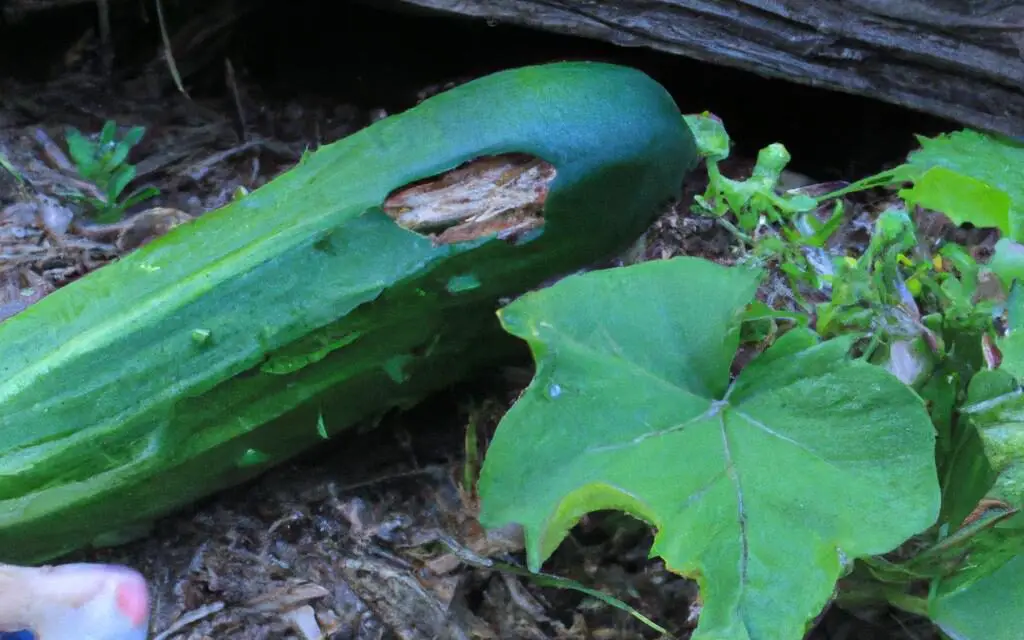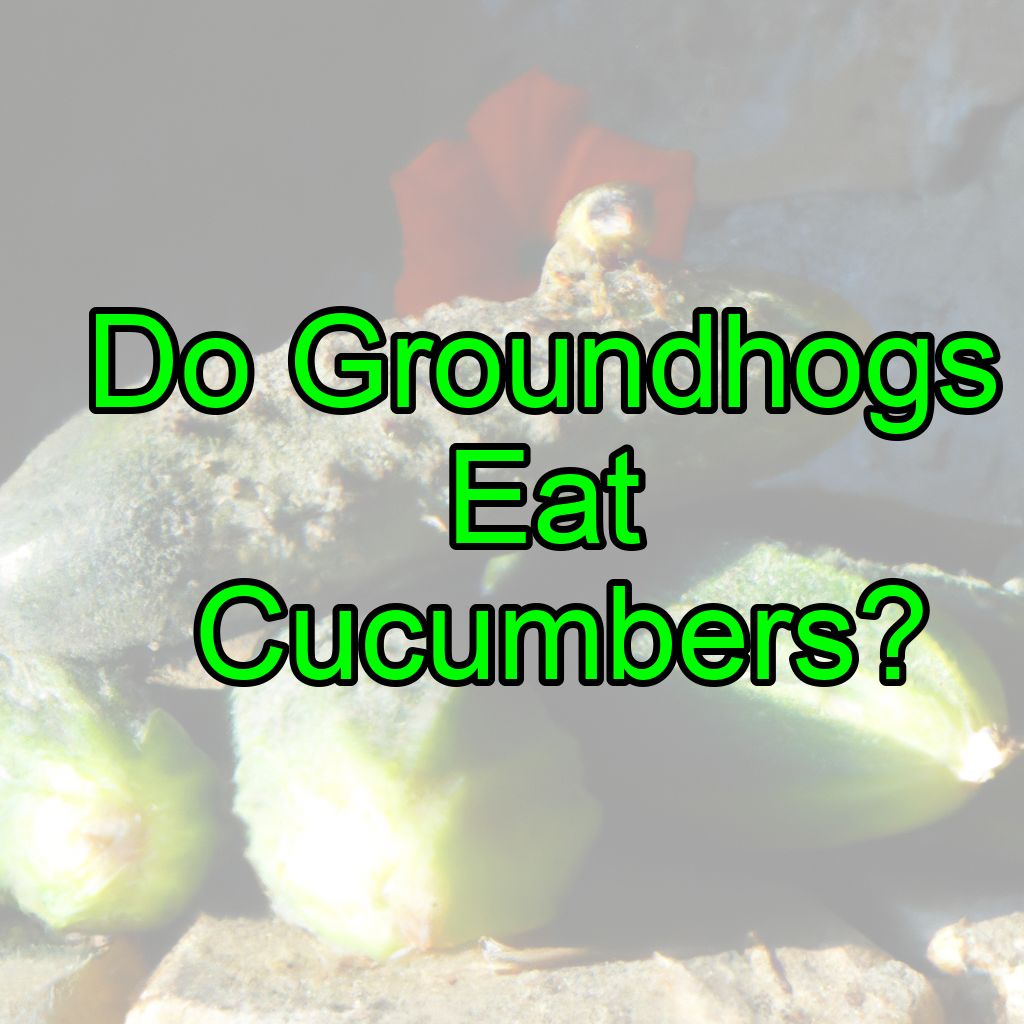As a backyard owner and gardening enthusiast, I’ve always been curious about the eating habits of the various creatures that visit my garden.
One animal that frequents my yard is the groundhog, also known as a woodchuck.
Recently, I observed a groundhog spending a lot of time near my cucumber plants, which led me to wonder: do groundhogs eat cucumbers?
Yes, groundhogs do eat cucumbers. They are known to consume various garden vegetables, including cucumbers, as part of their diet. To protect your cucumber plants, consider using fencing, repellents, or live traps to deter groundhogs from your garden.
In this blog post, I will discuss when, how, how often, and why groundhogs eat cucumbers, as well as the implications for backyard owners like myself.
Groundhog Diet Overview
Before diving into the specifics of groundhogs and cucumbers, it’s essential to understand the basics of a groundhog’s diet. Groundhogs are primarily herbivores, meaning they eat plant-based foods.
Their diet consists of a wide variety of plants, including grasses, clover, dandelions, and other vegetation.
Groundhogs and Cucumbers: When Do They Eat Them?
Groundhogs will eat cucumbers during the summer months when cucumbers are in season and readily available. Since groundhogs do not store food for the winter, they will eat as much as they can during the warmer months to build up fat reserves for hibernation.
This means that if they find a cucumber plant in your garden, they are likely to eat it.
How Do Groundhogs Eat Cucumbers?
Groundhogs have sharp incisors, which they use to bite off and chew cucumber leaves, stems, and fruits.

They tend to eat the entire cucumber plant, including the roots, if they can access them.
How Often Do Groundhogs Eat Cucumbers?
Groundhogs will eat cucumbers as often as they find them. If a groundhog discovers a cucumber plant in your garden, it will likely return to it regularly until the plant is destroyed or the groundhog has had its fill.
Why Do Groundhogs Eat Cucumbers?
Groundhogs eat cucumbers for the same reason they eat other plants: they provide essential nutrients that groundhogs need to survive. Cucumbers are a good source of water, vitamin C, and other nutrients that help groundhogs maintain healthy bodies and build up fat reserves for hibernation.
Implications for Backyard Owners
As a backyard owner, it’s important to be aware of the potential for groundhogs to eat your cucumber plants.
If you have a groundhog living nearby, you may need to take preventative measures to protect your cucumber plants from these hungry creatures.
This could involve fencing off your garden or using other methods to keep groundhogs from accessing the plants.
Other Animals That May Eat Cucumbers
Groundhogs are not the only animals that may be attracted to your cucumber plants. Other animals that might eat cucumbers include:
- Deer
- Rabbits
- Squirrels
- Insects (such as cucumber beetles)
Each of these animals has its own unique eating habits, and some may be more likely to target your cucumber plants than others.
How To Keep Groundhogs Out Of Your Yard!
There are several things that can be done to prevent groundhogs from digging and eating stuff in your backyard. I will list some of the strategies below.
Also, see my recent post if you want a full list of my favorite methods to keep groundhogs and gophers away!
1. Using ultrasonic sound
Groundhogs, like other bigger mammals that may invade your garden, tend to have very good hearing. This means that loud or consistent noises will scare them away or at least shorten their visits.
Check out my full buying guide for these ingenious ultrasonic repeller devices here!
One of my favorite technologies to keep pests away from my backyard is these cool solar-powered ultrasonic sound emitters that you can buy right from Amazon! In my experience, they really work, and the solar panels on top save you the time and money of changing batteries all the time.
They will also work against other rodents like gophers, mice, and rats!
2. Sprinkling natural repellents
Groundhogs may be scared off by using natural scents such as coyote urine or predator scents.
They may also cause them to leave if there is a combination of sounds being played from a radio. The sounds include the sound of barking dogs and coyotes.
You can sprinkle dog hair, cayenne pepper or strong enteric oils and other natural repellents around the garden to keep the groundhogs away.
See my complete list of humane ways to keep groundhogs away from your yard for more tips and tricks!
3. Fencing around the garden
You can also fence around your garden to keep groundhogs from entering the garden. It should be at least 3 feet deep and have a double row of fencing.
Groundhogs are good diggers so it has to go underground or they may find a way into the garden even with the fences in place!
4. Using live traps
You can use a live trap to capture groundhogs and move them to another area. Live trapping is currently the most humane way of groundhog control. Once you have removed all groundhogs from an area, it is important to ensure that they do not come back by using fencing or other barriers to block access.
You can also just buy a live trap, as the sturdy metal ones shown here:
To lure the groundhogs in, you can use one of the numerous favorite foods of groundhogs or an optimized extra attractive formula like this one to make the catch even quicker!
5. Using natural pesticides
There are pesticides or rodent toxins that can be used to kill groundhogs on your property. These may also affect other animals in the area so it is important to ensure that they are only sprayed on the targeted plants.
I do not recommend these, as I prefer more humane ways as described here. Also, anything that kills an animal will also harm humans to some degree, so go for a repellant rather than a toxin if you go the chemical route!
6. Using Scarecrows
You can use a scarecrow in your garden to keep groundhogs away. Groundhogs are afraid of novelty so time-sensitive or motion-activated scarecrows may also be effective in keeping them out of the garden.
7. Using Lights
Groundhogs are not strictly nocturnal animals but they are most active at low light so they do avoid areas with bright lights.
Motion-activated lights, sounds, and sprinklers may help prevent groundhogs from entering your yard.
Any blinking light will confuse and scare away groundhogs from your yard, especially if they are motion activated and sudden!
8. Motion-activated sprinklers
Like most animals, groundhogs hate surprises, and they will run away if suddenly sprayed with water. I like this solution because it is humane, simple, effective, and does not require much time to set up.
The Havahart 5277 is a motion-activated sprinkler that is activated by the movement of animals up to 25 feet away and sprays them with a harmless water jet, frightening them off and keeping them at bay.
The included metal stake makes it easy to install in your garden, and the sprinkler can be rotated 180 degrees for maximum coverage.
## Conclusion
In conclusion, groundhogs do eat cucumbers, and they will consume them as often as they can find them. This can be problematic for backyard owners who are trying to grow cucumbers in their gardens.
By understanding the eating habits of groundhogs and other animals that may be attracted to cucumber plants, you can better protect your garden and enjoy a bountiful harvest.















